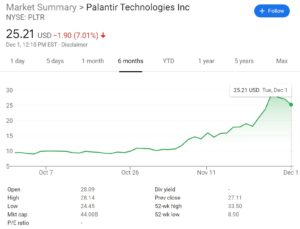How to Buy Palantir Shares UK – with 0% Commission
Palantir Technologies is an American big data analytics company that was founded in 2003 and went public on September 30 2020 at a price of $10 per share. By the end of November, the stock price had already more than doubled to $25.
According to market analysts, this data analysis company has the potential to see its share price appreciate by at least 30% from current levels. The tech startup, which many claim to be one of the most attractive and controversial IPOs in the market in recent years, has a market cap valuation of nearly $17bn and total revenues of $739m in 2019. With that said, Palantir is not yet profitable and there are crucial factors to consider before making an investment.
In this guide, we analyze Palantir’s share price performance and the company’s fundamentals. We’ll also show you the process of buying Palantir shares online in the UK, and suggest top UK stockbrokers.
Taking the above into consideration, below we suggest two trusted UK stock brokers that offer investors to buy Palantir shares. Plus500 is widely known as an easy-to-use trading platform as it covers a range of features that include price alerts service, a market news feed, a built-in charting package, risk management tools, and an economic calendar. The platform is available on any web browser as well on any mobile smartphone. On top of that, when you buy shares on Plus500, you can trade with more money than initially deposited. As the broker complies with FCA and ESMA regulatory rules and requirements, it enables investors to leverage their position with a ratio of 5:1. If opting for Plus500, you only need to meet a minimum deposit of £100 to get started, however, you can also trade on a demo account to backtest the platform which requires no deposit at all. Pros: Cons: 72% of retail investor accounts lose money when trading CFDs with this provider. Whether you’re looking to invest in Palantir or other software companies like Microsoft, it’s always important to do your research. Palantir began trading on the 30th of September under the ticker symbol PLTR following a widely covered initial public offering (IPO). The big data analytics company listed with a market cap valuation of nearly $17bn, and it’s already grown to $44 billion in just a few weeks. Palantir attracts a lot of interest from both buyers and the media, as well as criticism due to its secretive nature. Before you jump into investing in Palantir, it’s important to do your own research about the company’s fundamentals and its future forecast. Palantir Technologies was founded in Silicon Valley in 2003 by Alex Karp, Peter Thiel, Nathan Gettings, Joe Lonsdale, and Stephen Cohen. The American data analytics company has developed a specialised software that collects, analysis, and secures big data, mostly for government agencies including the FBI, CIA, NSA, and the US Air Force. Palantir has also worked with large companies to help them improve their business practices, increase efficiency, and enter new markets. Palantir has a reputation for being one of the most secretive companies in the world. Surprisingly little is known to the public about just what its algorithm is capable of, and the company has provoked fears about government spying activities. In addition, Reuters reported in past years that the company’s software has intentionally or unintentionally been used for racial profiling and is biased against some ethnic minorities. At the same time, the company has attracted controversy along the way due to its partnership with the US government, and in particular, the company’s work with the Immigration and Customs Enforcement agency (ICE). Since its foundation in 2003, Palantir Technologies has grown into one of the most successful startups in the US with a $17 billion market valuation and stable income. During this period of time, Palantir’s growth was very impressive. In 2014, it was valued at $9 billion, and in the following year, it reached a peak of $20 billion in market valuation. Many analysts, therefore, have stated that this is one of the most promising private technology companies. Ultimately, the software technology company went public on the stock market via a direct listing on September 30, 2020, which is an alternative way for private companies to go public, with the goal of removing the intervention of investment bankers. Palantir is, in fact, one of the few companies in the US market that have chosen to take this route. It is also interesting that the company chose to list on the NYSE as opposed to the NASDAQ, which is home to other US tech companies like Amazon, Nikola, and Facebook. At the time of the IPO, Palantir was trading in a narrow range from $9.03 – $10.95. However, over the month of November, Palantir shares more than doubled in value and hit a peak of $29.05 the day before the US stock market closed for the Thanksgiving holiday. At the time of writing, Palantir is trading at over $25 per share. Despite this early success, analysts are mixed in their reviews of Palantir’s share price, largely due to the lack of data and the ongoing controversy surrounding the company. Citron Research, a renowned short selling investment firm in the US, last week opened a short position against Palantir shares and called the company ‘a casino.’ Palantir went public in September 2020 and is listed on the New York Stock Exchange for slightly more than two months. It currently has a market capitalisation of nearly $44 billion, up from just $17 billion at the time of its IPO. The company’s Price Per Earnings (PE) is unknown but it has an impressively high Forward PE ratio of 227. For an unprofitable company, that means Palantir is trading at a very extreme valuation – even by the standards of the ultra-hot US tech sector. By comparison, even Amazon has a PE of just 93. In its first public half-year report, Palantir reported a loss of $0.36 per share (EPS) and it announced a net loss of $0.94 per share in its Q3 earnings report on November 12. That earnings report has largely been behind the recent explosion in Palantir’s share price, as the company also reported a 52% year-over-year sales increase. As Palantir is still in its growth stage and recently went public, the company has never paid dividends and is not expected to do so in the near future. Moreover, even though the company’s fundamentals are improving at a rapid pace, it still has a long way to profitability. However, analysts are still mixed about what the future holds for Palantir shares. There are some important red flags around this secretive company, which are important to fully understand before you invest. As such, let’s find out what you need to know about Palantir. Like many other tech companies, Palantir has never reported a profit. But the company’s future outlook is still looking bright. In the first half-year report, it reported a loss of $164.7 million, a decrease of 41% from the net loss of $281 million in 2019. Revenues grew by 49% to $481 million in the first half of 2020. The increase in revenues mostly came from increased demand for the company’s software due to the Covid-19 pandemic. Another reason for the spike in revenues can be attributed to Palantir’s Army division that posted $78.8 million in the first half of 2020, a huge increase from $53.7 million in all 2019. Investors were even more excited about Palantir’s Q3 earnings report, which showed that the coronavirus pandemic hasn’t slowed down the company’s growth at all. The company reported revenues of $289.4 million, a significant beat over analysts’ expectations of $279.4 million. Although the company also reported a quarterly loss of $0.94 per share, this was less important in the eyes of many analysts since the company is not expected to be profitable in the near future. Even before 2020, the company’s growth was very impressive. It generated full-year revenue of $742.6m in 2019, an increase of 25% from the previous year. At the same time, it didn’t spend more money to increase its revenue – Palantir reported the same net loss of $580 million in 2018 and 2019. Full-year revenue for 2020 is expected to $1.07 billion, according to Palantir’s Q3 earnings report, which would represent a 44% revenue jump compared to 2019. A major concern for analysts over Palantir’s business is that the company is predicated on having a small number of extremely high-value clients. At the time of its IPO, Palantir reported just 125 clients. In 2019, 68% of Palantir’s revenue came from its top 20 clients. Moreover, 54% of Palantir’s revenue came from US government clients in 2019. That number is particularly worrying because the Trump administration has been notably more friendly to companies like Palantir than a Biden administration is likely to be. Palantir’s clients include ICE, the CIA, FBI, and DHS, as well as military agencies like the US Air Force, US Marines, and West Point military academy. Significant changes in the policies and political directors of these departments, and particularly ICE and DHS, under a Biden administration could mean less business for Palantir over the next few years. Notably, Palantir has come under increasing scrutiny from civil rights groups that form the base of the Democratic Party for its role in helping ICE track illegal immigrants throughout the US. The good news is that Palantir has been working extremely hard to diversify its client base – both by bringing on more customers and by transitioning from a focus on government clients to commercial clients. While Palantir didn’t give an update on its total number of clients in its Q3 earnings report, the company did note that the contribution of its top 20 clients to its total revenue fell from 68% to 61%. While that’s still worryingly high for analysts, it demonstrates that the company understands its position and is working to gain more clients. Along the same lines, Palantir is moving from being a full-service company that integrates its employees with its clients’ organizations to a simple provider of software as a service (SaaS). As Palantir makes its product more accessible for new clients, costs will drop and it should be an easier sell for medium-sized enterprises to sign on to Palantir’s data analytics system. In fact, this move towards diversification was so promising that George Soros, the famed investor, invested in Palantir in the wake of the company’s earnings report. The investment came as Soros also moved money into Disney and exited some financial stocks like Bank of America. Palantir might also be a solid Covid-19 investment. A report from the Wall Street Journal has suggested the company will help the US government track Covid-19 vaccines as they are distributed around the country. The tool developed by Palantir will essentially track the manufacture, distribution, and administration of Covid-19 vaccines across the United States. As such, the Tiberius project could be a huge incentive for potential investors. Surprisingly, despite the potential importance of this project, Palantir was virtually silent about Tiberius on its Q3 earnings call. It is not clear whether the project will go ahead under the Biden administration and very little has been reported on Palantir’s role in distributing a coronavirus vaccine since the original Wall Street Journal report. One major red flag that made waves ahead of Palantir’s direct listing is the way in which the company has designed its governance. In a typical IPO, governing power is awarded to the primary shareholder or to a group of majority shareholders. However, Palantir set up its shares such that its founders – Karp, Thiel, and Cohen – can unilaterally adjust their voting power at will. That effectively means that regardless of what shareholders want Palantir to do, these three men have complete control over the company. Everyone else is just along for the ride. That’s not necessarily a bad thing. Karp, Thiel, and Cohen obviously understand what it takes to run and grow Palantir. However, given that Palantir continues to burn through money, the control that these founders have over the company’s future is worrying to analysts and investors. If you believe in their vision, then Palantir’s governance structure is not a problem. But if you aren’t convinced that Karp, Thiel, and Cohen have the best interests of investors in mind, you may want to think twice about Palantir’s shares. Because of the secretive nature of Palantir, it somewhat difficult to analyze this company. There are more rumors on social media about this company’s business than there are real financial filings and news reports. Moreover, as the company just recently went public, it has a limited history of price data. That said, Palantir has already exceeded the expectations of most analysts in its first two months of trading. The company’s shares have more than doubled in value, in large part thanks to its strong Q3 earnings report. The company has managed to dramatically grow revenue and build out its client base, helping to alleviate some of the concerns that investors had going into Palantir’s IPO. If Palantir continues down the path it painted in its earnings report in mid-November, investors will quickly come around to Palantir’s unusual business practices and structure. Still, it’s almost impossible to know what the future holds for Palantir. With the transition from a Trump to a Biden administration, it is possible that Palantir could lose a significant chunk of government business. The company’s technology and services are controversial, particularly within the Democratic Party. In addition, the company’s unique governance structure gives its founders virtually unchecked control over Palantir. No matter what way you look at it, Palantir shares are a high risk investment. Palantir’s clients are enormously committed to its software, which bodes well if the company is able to reach a broader market. At the same time, there are more questions than answers when it comes to Palantir. So, we recommend that you have a strong stomach if you want to buy Palantir shares. In summary, Palantir is a secretive company that has turned stock market orthodoxy on its head. It is sort of a defense company that sells data analytics software to private corporations and government agencies, and so far it has proven to have a business model that produces results and high growth. However, the company has a founder-focused governance structure, a controversial business model, and a long way to profitability. While there are risks involved with investing in Palantir, in our view it appears to be one of the best potential high growth stocks in the market right now. If you’re ready to buy Palantir Technology shares, simply click the link below to get started!
Alex Karp is the co-founder and CEO of Palantir since 2004. Karp is an American businessman with a net worth of $1.2bn.
Palantir is listed on the New York Stock Exchange (NYSE) under the symbol PLTR.
Like many other growth tech companies, Palantir does not yet pay dividends to shareholders.
At present, the easiest way to buy shares of Palantir is via a broker.
Yes, you will be able to find UK share trading accounts that offer you to buy individual US shares like Palantir. However, only a limited number of UK stockbrokers allow you to buy Palantir shares via an ISA or SIPP account. WARNING: The content on this site should not be considered investment advice and we are not authorised to provide investment advice. Nothing on this website is an endorsement or recommendation of a particular trading strategy or investment decision. The information on this website is general in nature, so you must consider the information in light of your objectives, financial situation and needs. Investing is speculative. When investing your capital is at risk. This site is not intended for use in jurisdictions in which the trading or investments described are prohibited and should only be used by such persons and in such ways as are legally permitted. Your investment may not qualify for investor protection in your country or state of residence, so please conduct your own due diligence or obtain advice where necessary. This website is free for you to use but we may receive a commission from the companies we feature on this site. Buyshares.co.uk provides top quality insights through financial educational guides and video tutorials on how to buy shares and invest in stocks. We compare the top providers along with in-depth insights on their product offerings too. We do not advise or recommend any provider but are here to allow our reader to make informed decisions and proceed at their own responsibility. Contracts for Difference (“CFDs”) are leveraged products and carry a significant risk of loss to your capital. Please ensure you fully understand the risks and seek independent advice. By continuing to use this website you agree to our privacy policy. Trading is risky and you might lose part, or all your capital invested. Information provided is for informational and educational purposes only and does not represent any type of financial advice and/or investment recommendation. Crypto promotions on this site do not comply with the UK Financial Promotions Regime and is not intended for UK consumers. BuyShares.co.uk © 2025 All Rights Reserved. UK Company No. 11705811.
Step 1: Find a UK Stock Broker That Offers Palantir Shares

1. Plus – UK CFD Broker with Low Fees

Step 2: Research Palantir Shares
How Much Are Palantir Shares Worth? Palantir Share Price History
Palantir Share Fundamentals – Market Cap, P/E Ratio and EPS
Palantir Shares Dividend Information
Should I Buy Palantir Shares?

Revenues Are Expected to Grow Despite the Covid-19 Pandemic
A Diversity of Clients
The Tiberius Project
Governance Structure
Palantir Shares: Buy or Sell?
The Verdict
FAQs
Who is the chief executive of Palantir?
What stock exchange is Palantir Technology listed on?
Does Palantir pay dividends?
How do I buy shares in Palantir?
Can I invest in Palantir via an ISA or SIPP?
Tom Chen

